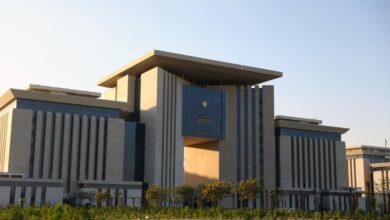
With just a few months to go before the parliamentary elections for the House of Representatives, and despite the high hopes of many to be represented in this council, the government has yet to introduce a new draft law for holding the parliamentary elections.
Many individuals and political parties are undoubtedly awaiting this new law, as it will allow them to study plans and develop alternatives for participating in these elections.
If the elections are held under the majority system – using the traditional individual method that has characterized most Egyptian parliamentary elections since 1866 – things will be much easier for everyone, as the participants in these elections will be individuals who meet simple conditions related to possessing political and civil rights.
If the electoral system is the proportional representation system, which was the basis for the 1984 parliamentary elections, then the elections will be primarily determined by political parties, and the council will be formed of political forces through a more fair and objective representation, as it is linked to translating votes into seats at a nearly equivalent ratio.
There is also, of course, the mixed system, which was used in the elections of 1987, 2012, 2016, and 2020.
Here, the electoral systems have varied in terms of the form of the mix between proportional representation and the majority system using the individual method, as in the 1987 and 2012 elections. And the form of the mix between the majority system with the flawed and internationally abandoned absolute list system, and the majority system using the individual method, as in the last two elections.
Naturally, the agreed regime will depend on several considerations.
Through this system, the shape of the public sphere will be determined, which began to disintegrate in the direction of openness after the move to remove hundreds from the lists of terrorist individuals and entities.
It will also depend on the extent to which a system is put in place that complies with the six social quotas established in the Constitution, which strain the legislator to be represented within the new law.
There is no doubt that the form of constituencies that everyone who wants to participate in these elections – both individuals and parties – is interested in will differ. Large electoral districts will be the share of the proportional system, and with them a greater degree of proportionality will be achieved the larger the size of the district.
Moreover, these constituencies will be limited in space once the majority regime adopts the individual style, and here there will be a wide field for the spread of electoral money and neuroses of various kinds and their repercussions.
The most controversial system, which is the majority system through absolute lists, will inevitably have very large constituencies, to the extent that individuals and small parties are not able to run in these elections.
The national dialogue between political parties and forces has not reached a consensus on the electoral system, leaving the government in a dilemma about which system to adopt.
Time is of the essence, and a decision on an electoral system is crucial.
However, it is even more important that this system reflects a genuine desire for political openness and fair party representation, creating a strong parliament capable of balancing relations with the executive and judicial branches.
Author’s bio:
Amr Hashim Rabie is the Deputy Chairman of the Al-Ahram Center for Strategic and Political Studies and Member of the Board of Trustees of the National Dialogue in Egypt.




